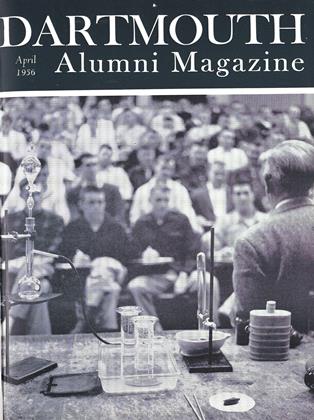By SamuelFrench Morse '36. Denver: Alan Swallow,1955. 62 pp. $2.50.
The causes may be scattered, but the effects are succinctly composed in this volume of quiet poems which are not so quiet as they seem at first. They have a tough Yankee quality of not giving everything away at an opening bid or admitting all on a single asking. It is on the second and third reading that their wit and passion emerge from a texture deceptively sober. Examples of Morse s special wit are found in stanzas one and three of "The Mirroring Mind"; subtitle "Le Roi Soleil":
I
We see behind us, like that clever king Whose marvelous ambition bred despair Upon magnificence to make the air Alive with his reflections everywhere, But could not see ahead to anything.
III
Perhaps the silver giving back the light Inside the mind is not a trick at all.
The world reversed and left confused with right (Till right is wrong?) astonish and appall Our common sense....
Two poems of special interest to men of Dartmouth are dedicated to Sidney Cox: "Soldier Sewing on Chevrons" and "Another Soldier from the Aleutians." From these I shall quote the lines which seem most appropriate to the dedicatee:
He knows the rest, The voyage, and the distance that the heart Imagines he must go, the sober test Courage has set upon his honest speech.
There is a healthy balance of concrete and abstract in this work. The particularities of New England scenery and weather, the joys of woods and home, the familiar realities that are the raw stuff of poetry are here, properly transmuted into art. But the guiding spirits of Morse's poetry are the three great abstractions, Faith, Hope and Love, and he has the disarming habit of coming right out with them by name in a thoroughly non-avant-garde Hope and Love are named, and Faith is implied in the first five lines of the book's first poem: "Variations: For Hope."
You have this way for love, that you define In the old passion, strict to growth, and slow. Morning was cold and blue, the thinning line Between the year's end and the coming snow. And hope is what it is, part of your world.
These three words and their meanings are the scattered causes to be found all the way through the book: talismans of the poet's thinking and feeling against the unthinking and unfeeling of the world he has to write in.
 View Full Issue
View Full Issue
More From This Issue
-
 Feature
FeatureThe Hopkins Center Concept
April 1956 -
 Feature
FeatureTHE MOCK-DUEL MURDER
April 1956 By EDWARD CONNERY LATHEM '51 -
 Feature
FeatureELECTION-YEAR CONFERENCE
April 1956 By ROBERT H. GILE '56 -
 Feature
FeatureA Tuckerman Tradition
April 1956 By ROBERT S. MONAHAN '29 -
 Class Notes
Class Notes1918
April 1956 By ERNEST H. EARLEY, RICHARD A. HOLTON -
 Class Notes
Class Notes1929
April 1956 By CHRISTIAN E. BORN, JOHN W. MOXON
DILYS LAING
Books
-
 Books
BooksJOURNEYS THROUGH THE AMERICAS
April 1952 By Albert S. Carlson -
 Books
BooksSPARROW HAWKS
October 1950 By F. Cudworth Flint -
 Books
BooksECONOMIC PRINCIPLES IN PRACTICE,
May 1942 By G. W. WoodWorth -
 Books
BooksZEHN JAHRZEHNTE 1860-1960.
December 1959 By HERBERT R. SENSENIG '28 -
 Books
BooksTHE BULLS AND THE BEARS: HOW THE STOCK EXCHANGE WORKS.
DECEMBER 1967 By JOHN HURD '21 -
 Books
BooksTUMOR SURGERY OF THE HEAD AND NECK.
May 1958 By WILLIAM T. MOSENTHAL '38, M.D.


